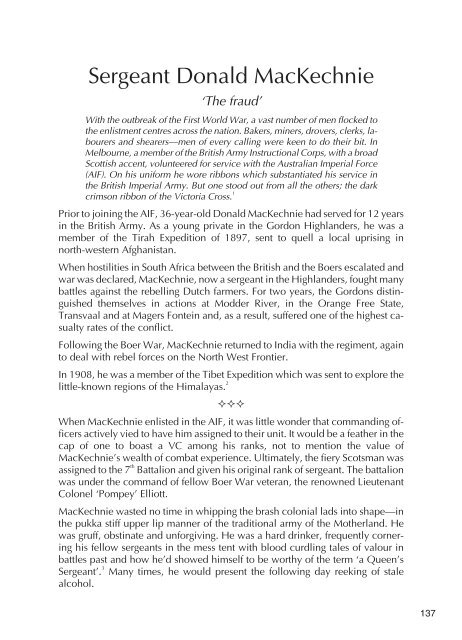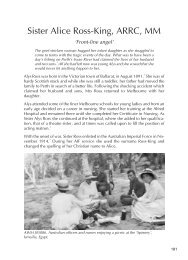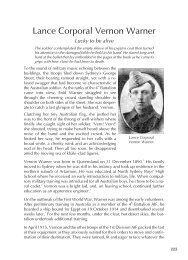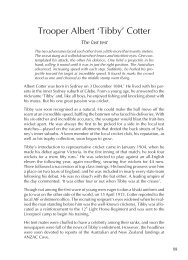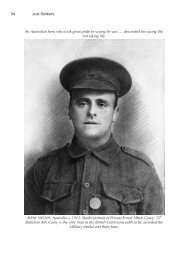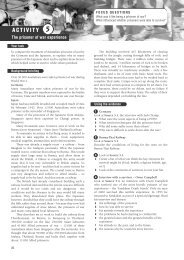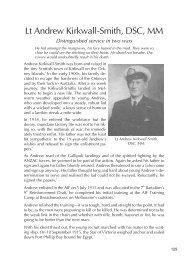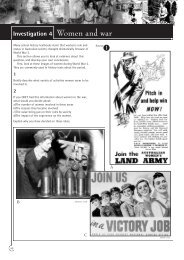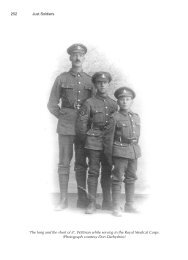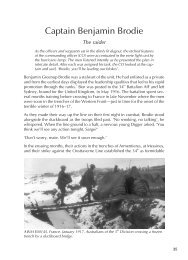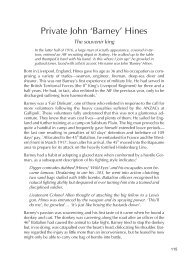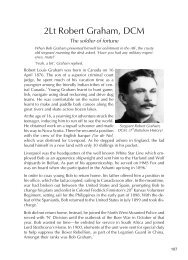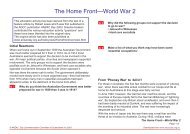Sergeant Donald MacKechnie
Sergeant Donald MacKechnie
Sergeant Donald MacKechnie
Create successful ePaper yourself
Turn your PDF publications into a flip-book with our unique Google optimized e-Paper software.
<strong>Sergeant</strong> <strong>Donald</strong> <strong>MacKechnie</strong><br />
‘The fraud’<br />
With the outbreak of the First World War, a vast number of men flocked to<br />
the enlistment centres across the nation. Bakers, miners, drovers, clerks, labourers<br />
and shearers—men of every calling were keen to do their bit. In<br />
Melbourne, a member of the British Army Instructional Corps, with a broad<br />
Scottish accent, volunteered for service with the Australian Imperial Force<br />
(AIF). On his uniform he wore ribbons which substantiated his service in<br />
the British Imperial Army. But one stood out from all the others; the dark<br />
crimson ribbon of the Victoria Cross. 1<br />
Prior to joining the AIF, 36-year-old <strong>Donald</strong> <strong>MacKechnie</strong> had served for 12 years<br />
in the British Army. As a young private in the Gordon Highlanders, he was a<br />
member of the Tirah Expedition of 1897, sent to quell a local uprising in<br />
north-western Afghanistan.<br />
When hostilities in South Africa between the British and the Boers escalated and<br />
war was declared, <strong>MacKechnie</strong>, now a sergeant in the Highlanders, fought many<br />
battles against the rebelling Dutch farmers. For two years, the Gordons distinguished<br />
themselves in actions at Modder River, in the Orange Free State,<br />
Transvaal and at Magers Fontein and, as a result, suffered one of the highest casualty<br />
rates of the conflict.<br />
Following the Boer War, <strong>MacKechnie</strong> returned to India with the regiment, again<br />
to deal with rebel forces on the North West Frontier.<br />
In 1908, he was a member of the Tibet Expedition which was sent to explore the<br />
little-known regions of the Himalayas. 2<br />
<br />
When <strong>MacKechnie</strong> enlisted in the AIF, it was little wonder that commanding officers<br />
actively vied to have him assigned to their unit. It would be a feather in the<br />
cap of one to boast a VC among his ranks, not to mention the value of<br />
<strong>MacKechnie</strong>’s wealth of combat experience. Ultimately, the fiery Scotsman was<br />
assigned to the 7 th Battalion and given his original rank of sergeant. The battalion<br />
was under the command of fellow Boer War veteran, the renowned Lieutenant<br />
Colonel ‘Pompey’ Elliott.<br />
<strong>MacKechnie</strong> wasted no time in whipping the brash colonial lads into shape—in<br />
the pukka stiff upper lip manner of the traditional army of the Motherland. He<br />
was gruff, obstinate and unforgiving. He was a hard drinker, frequently cornering<br />
his fellow sergeants in the mess tent with blood curdling tales of valour in<br />
battles past and how he’d showed himself to be worthy of the term ‘a Queen’s<br />
<strong>Sergeant</strong>’. 3<br />
Many times, he would present the following day reeking of stale<br />
alcohol.<br />
137
138 Just Soldiers<br />
There were suspicions he was wont to take a swig through the day from a bottle<br />
carefully hidden in the bottom of his kit bag. To those around him, whether superior,<br />
subordinate or peer, he wore the medal of a hero and they turned a blind<br />
eye to his behaviour, as long as he delivered. They felt sure that in battle he<br />
would display the true qualities that had earned him his Victoria Cross.<br />
After only two months of training, the 7 th set sail as part of the ‘first fleet’ headed<br />
for Europe and the war with the Hun. The entry of Turkey into the war as an ally<br />
of Germany resulted in the troops of the AIF being diverted to Egypt for additional<br />
training—rather than England, where a cold wet winter would cause<br />
havoc, and suitable camps for the AIF were not yet ready. 4<br />
Training and living in the shadows of the great pyramids, and partaking of the<br />
sights, sounds and smells of Egypt was an exciting experience for the young Australians.<br />
Before enlisting in the AIF, many had never ventured further than fifty<br />
kilometres from where they were born.<br />
When on leave, the attractions that nearby Cairo had to offer were like a magnet<br />
to the Diggers. Liquor was cheap and plentiful, and the ladies of the night plied<br />
their trade for a modest fee in the brothel area known to the Australian troops as<br />
the ‘Wozzer’. 4<br />
With monotonous regularity, <strong>Sergeant</strong> <strong>MacKechnie</strong> would stagger in from leave,<br />
then turn out to inspect the guard. During these parades, he would hurl abuse at<br />
the young Diggers, castigating them for what he considered to be their sloppy<br />
appearance. With a venomous tongue, he would berate them, asserting that they<br />
would never make it in the ‘real’ army. He would then weave his way back to his<br />
bivvy to sleep it off. 3<br />
<br />
In late March, the army’s patience was wearing a little thin and eventually<br />
<strong>MacKechnie</strong> pushed his luck a little too far when he returned to camp rolling<br />
drunk. As the MPs took charge at the gate and ushered the sergeant towards the<br />
cells, <strong>MacKechnie</strong> drew their attention to his VC medal and challenged them to<br />
recognise with whom they were dealing.<br />
‘Yes mate, we know who you are. But it’s still off to the lock-up for you!’ the MP<br />
sergeant retorted.<br />
On the 18 April 1915, the army had had enough of <strong>MacKechnie</strong>’s antics and he<br />
was brought before a general court martial on a charge of drunkenness. The<br />
court found him ‘Guilty as charged’ and sentenced him to ‘Reduction to the<br />
ranks’. <strong>MacKechnie</strong> looked the presiding officer in the eye, saluted, turned and<br />
marched out. 2<br />
By April 1915, rumblings of imminent involvement in the war began to stir the<br />
ANZAC lines. Equipment was packed and weapons checked and re-checked.
<strong>Sergeant</strong> <strong>Donald</strong> <strong>MacKechnie</strong> 139<br />
AWM C00183. Unidentified soldiers and civilians strolling in Esbekiah Street in a<br />
quarter of Cairo known as the Haret el Wasser, but referred to by the soldiers as ‘The<br />
Wozzer’. Not long before, aggrieved Australian and New Zealand soldiers had run<br />
amok, throwing bedding, mattresses and clothing from several brothels into the street<br />
and burning them.<br />
The soldiers of Australia and New Zealand were ready for anything—or so they<br />
thought.<br />
It was just before dawn, 25 April 1915. All that could be heard above the beating<br />
of many hearts was the gentle splashing of the oars as the boats moved slowly towards<br />
the silhouette of the rugged hills. Unbeknown to the soldiers in the boats,<br />
the single rifle shot that shattered the eerie silence was to be the precursor to an<br />
unbelievable carnage that would last for the next eight months. This was to be a<br />
place that would, from that day, be embedded in the psyche of all Australians<br />
and New Zealanders—Gallipoli.<br />
When the soldiers of the 7 th stormed ashore, they were confronted with terrain<br />
that bore no resemblance to what had been described to them in the pre-landing<br />
brief. Instead of a gradual incline from the sea to the ridges, they were confronted<br />
by a narrow strip of beach at the base of sheer cliffs.<br />
As the officers and non commissioned officers (NCOs) gathered the scattered<br />
remnants of their platoons, they knew that to hold their men on the beach was as<br />
good as signing their death warrants. Their only option was to scale the cliffs and<br />
seek shelter from the murderous enemy fire.
140 Just Soldiers<br />
AWM P01130.002. ANZAC Cove, Gallipoli, Turkey, 1915. A view of ANZAC Cove<br />
looking north toward New Zealand Point.<br />
The 7 th pushed forward up the left flank of the small strip of beach. The Turks<br />
held the high ground and were fiercely protective of their land. They attacked<br />
the invaders with a vengeance, mowing down wave after wave of ANZACs as<br />
they struggled to cross the narrow beach and scramble up the rugged slopes and<br />
out of the line of fire.<br />
The young Australian soldiers strained under the weight of their packs, hampered<br />
by clothing that had become waterlogged as they waded ashore, controlling<br />
their emotions as they sidestepped the bodies of fallen mates and dodged<br />
those who tumbled down the slope around them.<br />
The Diggers’ physical fitness from the months of training at the desert camps,<br />
and their overwhelming instinct for survival kept them going till they reached the<br />
top. Only then could they put rifles to their shoulders and fight back.<br />
No sooner had Mackechnie reached the summit than a Turkish soldier manoeuvred<br />
his rifle sight to his eye, focussing on the private as slowly he squeezed<br />
the trigger—the crack of the primer’s detonation echoing in his ears. As if in slow<br />
motion the private turned and to face the Turk, at the same time feeling a sensation<br />
akin to a red-hot poker being rammed into his right shoulder. He crumpled<br />
to his knees. 2
<strong>Sergeant</strong> <strong>Donald</strong> <strong>MacKechnie</strong> 141<br />
As the battle moved forward, the stretcher-bearers kept pace, searching for the<br />
wounded. <strong>MacKechnie</strong> was one of many carried to the beach for medical treatment.<br />
His wound was serious enough to warrant evacuation to a hospital ship lying<br />
offshore and, on 7 May 1915, he was admitted to the 2 nd Australian General<br />
Hospital in Cairo. 2<br />
<strong>MacKechnie</strong> was instantly the centre of attention. The wards were abuzz: not<br />
only was there a VC hero amongst the patients, but one who had been wounded<br />
during the Gallipoli landing.<br />
<strong>MacKechnie</strong> required ongoing treatment for his shoulder wound. As the bullet<br />
had fragmented on entry, not all of the shrapnel could be removed. Complications,<br />
including arthritis, set in. At the same time <strong>MacKechnie</strong> had also developed<br />
a chronic eye disorder. The decision was made to evacuate him to<br />
Australia for specialist treatment.<br />
At a medical board attended by Private <strong>MacKechnie</strong>, it was determined that, due<br />
to his deteriorating health, he should be discharged from the AIF.<br />
While the administrative tasks for <strong>MacKechnie</strong>’s demobilisation were being<br />
completed, a young clerk proceeded to compile the paperwork required for<br />
<strong>MacKechnie</strong> to receive a medical pension. Being a little more methodical than<br />
others, the clerk discovered that all VC recipients were paid an annual gratuity,<br />
which he was sure could be incorporated into the pension.<br />
However, the clerk could not find any record of <strong>MacKechnie</strong> having received<br />
his gratuity. Upon further investigation, he found a James McKechnie on the VC<br />
roll, but this Scotsman, at around the age of 28, had been awarded the medal in<br />
1854 for his gallantry during the Crimean War. Even allowing for the different<br />
Christian name and the spelling variation of the surname, if they were one and<br />
Part of <strong>MacKechnie</strong>'s service records showing VC crossed out.
142 Just Soldiers<br />
the same person then <strong>Donald</strong> <strong>MacKechnie</strong> would have to be aged around 90<br />
years old—an impossibility. 3<br />
The clerk was confused so took his findings to his adjutant, who in turn took<br />
them to his commanding officer. There had to be some explanation.<br />
A cable was sent to the headquarters of the Gordon Highlanders, requesting details<br />
of the circumstances of <strong>MacKechnie</strong>’s Victoria Cross. The Highlanders responded<br />
that they had no record of the award being made.<br />
<strong>MacKechnie</strong> was paraded before the commanding officer who asked one simple<br />
question. ‘We have reason to believe that you are a fraud, that you have never<br />
been awarded the Victoria Cross, is this true?’ As he struggled for words,<br />
<strong>MacKechnie</strong> knew that his deception had been discovered and the charade was<br />
over.<br />
As news of his deceit spread, he was ostracised and ridiculed— yesterday’s hero<br />
had become today’s fool. He was subsequently discharged from the AIF on medical<br />
grounds.<br />
<strong>MacKechnie</strong>’s physical and mental health deteriorated as he struggled to comprehend<br />
the magnitude of his deception and the persecution and torment that he<br />
now faced. Eventually he could no longer cope and in 1917 he was committed<br />
to the Ballarat Hospital for the Insane. His wife Edith stood by him and supported<br />
him as a loyal and faithful wife. 5<br />
Until his death on 18 May 1920, Private <strong>Donald</strong> <strong>MacKechnie</strong> spent most of his<br />
days sitting, staring out the window. 6 Who’s to say what he was thinking. Was he<br />
remembering the long-ago battles in the rugged mountains of the North West<br />
Frontier? Was he fighting the Boer farmers on the South African veld? Or was he<br />
trekking through the snows of Tibet?<br />
Perhaps he was simply coming to terms with his guilt.<br />
Notes<br />
1 Dean A & Gutteridge EW, The Seventh Battalion, A.I.F : Resume of the Activities of the Seventh Battalion in the<br />
Great War, 1914-1918, W & K Purbrick, Melbourne, 1933<br />
2 National Archives of Australia: B2455, WW1 Service Records, 523 <strong>Sergeant</strong> D <strong>MacKechnie</strong> (VC)<br />
3 AWM 140 Official History, 1914-1918 War, biographical cards, <strong>MacKechnie</strong> D (Notes detailing <strong>MacKechnie</strong>’s<br />
character. Author unknown signed A.V.W.)<br />
4 Bean CEW, The Official History of Australia in the War 1914-1918, Volume 1, Australian War Memorial, Canberra,<br />
1936<br />
5 On examining <strong>MacKechnie</strong>’s service records it is interesting to note that <strong>Donald</strong> spelt and signed his surname<br />
<strong>MacKechnie</strong>, his wife Edith signed her name McKechnie, the same spelling as that of the actual Victoria Cross<br />
recipient. Other documents contained within the file are also spelt McKechnie. Perhaps this constant incorrect<br />
spelling of his surname contributed to his being found out.<br />
6 Memo from Colonel, A.A.G. 3rd Military District to Australian Military Forces Headquarters, Melbourne, 12 June<br />
1920


